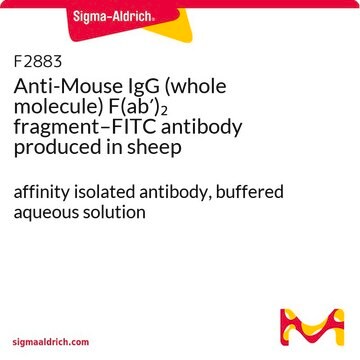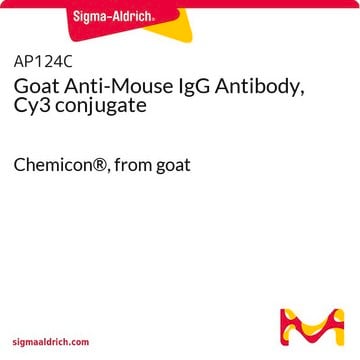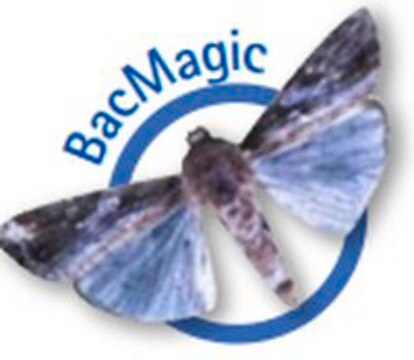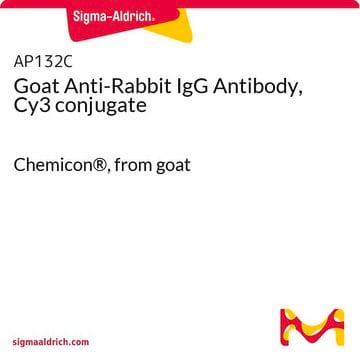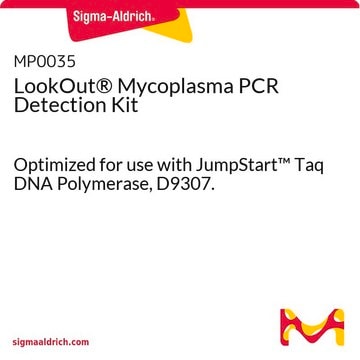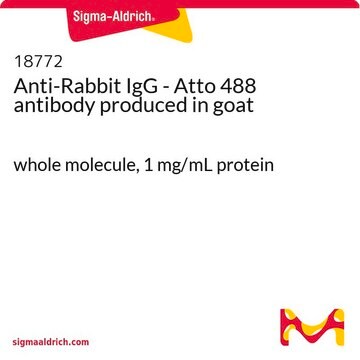C2306
Anti-Rabbit IgG (whole molecule), F(ab′)2 fragment–Cy3 antibody produced in sheep
affinity isolated antibody, buffered aqueous solution
Sinónimos:
Anti-Rabbit IgG Cy3, Cy3 Anti-Rabbit IgG
Iniciar sesiónpara Ver la Fijación de precios por contrato y de la organización
About This Item
Productos recomendados
biological source
sheep
Quality Level
conjugate
CY3 conjugate
antibody form
affinity isolated antibody
antibody product type
secondary antibodies
clone
polyclonal
form
buffered aqueous solution
species reactivity
rabbit
technique(s)
immunohistochemistry (formalin-fixed, paraffin-embedded sections): 1:100
shipped in
wet ice
storage temp.
2-8°C
target post-translational modification
unmodified
General description
Anti-Rabbit IgG (whole molecule), F(ab′)2 fragment–Cy3 antibody produced in sheep binds to all rabbit Igs and is useful when trying to avoid background staining due to the presence of Fc receptors.
The monomeric structure of immunoglobulin G (IgG) consists of two identical heavy chains and two identical light chains with molecular weight of 50kDa and 25kDa, respectively. The primary structure of this antibody also contains disulfide bonds involved in linking the two heavy chains, linking the heavy and light chains and resides inside the chains. IgG is further subdivided into four classes namely, IgG1, IgG2, IgG3, and IgG4 with different heavy chains, named γ1, γ2, γ3, and γ4, respectively. Limited digestion using papain cleaves the antibody into three fragments, two of which are identical and contain the antigen-binding activity (Fab fragments).
Application
Anti-Rabbit IgG (whole molecule), F(ab′)2 fragment-Cy3 antibody produced in sheep may be used for immunohistochemistry at a dilution of 1:100 and for immunocytochemistry.
Biochem/physiol Actions
IgG antibody subtype is the most abundant of serum immunoglobulins of the immune system. It is secreted by B cells and is found in blood and extracellular fluids and provides protection from infections caused by bacteria, fungi and viruses. Maternal IgG is transferred to fetus through the placenta that is vital for immune defense of the neonate against infections. The coupling of Cy3 to Anti-Rabbit IgG (whole molecule), F(ab′)2 fragment antibody allows for the visualization of proteins by fluorescent microscopy.
Physical form
Solution in 0.01 M phosphate buffered saline, pH 7.4, containing 1% bovine serum albumin and 15 mM sodium azide
Legal Information
Cy is distributed under license from Amersham Biosciences Limited.
Disclaimer
Unless otherwise stated in our catalog or other company documentation accompanying the product(s), our products are intended for research use only and are not to be used for any other purpose, which includes but is not limited to, unauthorized commercial uses, in vitro diagnostic uses, ex vivo or in vivo therapeutic uses or any type of consumption or application to humans or animals.
¿No encuentra el producto adecuado?
Pruebe nuestro Herramienta de selección de productos.
Storage Class
10 - Combustible liquids
wgk_germany
nwg
flash_point_f
Not applicable
flash_point_c
Not applicable
Elija entre una de las versiones más recientes:
¿Ya tiene este producto?
Encuentre la documentación para los productos que ha comprado recientemente en la Biblioteca de documentos.
Los clientes también vieron
Diana L Williams et al.
Neuropharmacology, 131, 83-95 (2017-12-10)
Glucagon-like peptide-1 (GLP-1) injected into the brain reduces food intake. Similarly, activation of preproglucagon (PPG) cells in the hindbrain which synthesize GLP-1, reduces food intake. However, it is far from clear whether this happens because of satiety, nausea, reduced reward
Jessica E Poort et al.
Human molecular genetics, 25(17), 3768-3783 (2016-08-06)
Spinal bulbar muscular atrophy (SBMA) is a progressive, late onset neuromuscular disease causing motor dysfunction in men. While the morphology of the neuromuscular junction (NMJ) is typically affected by neuromuscular disease, whether NMJs in SBMA are similarly affected by disease
Tayaramma Thatava et al.
Stem cells (Dayton, Ohio), 24(12), 2858-2867 (2006-09-23)
Type 1 diabetes is caused by the destruction of pancreatic beta-cells by T cells of the immune system. Islet transplantation is a promising therapy for diabetes mellitus. Bone marrow stem cells (BMSC) have the capacity to differentiate into various cell
Yuan Wang et al.
International journal of molecular medicine, 40(2), 474-482 (2017-06-29)
The pathogenesis of Japanese encephalitis virus (JEV) is complex and unclearly defined, and in particular, the effects of the JEV receptor (JEVR) on diverse susceptible cells are elusive. In contrast to previous studies investigating JEVR in rodent or mosquito cells, in this
Pranitha Kamat et al.
PloS one, 11(12), e0168541-e0168541 (2016-12-22)
Calcium and iron overload participate in the mechanisms of ischemia/reperfusion (I/R) injury during myocardial infarction (MI). Calcium overload induces cardiomyocyte death by hypercontraction, while iron catalyses generation of reactive oxygen species (ROS). We therefore hypothesized that dexrazoxane, an intracellular metal
Nuestro equipo de científicos tiene experiencia en todas las áreas de investigación: Ciencias de la vida, Ciencia de los materiales, Síntesis química, Cromatografía, Analítica y muchas otras.
Póngase en contacto con el Servicio técnico
